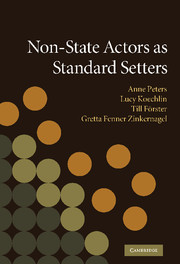Book contents
- Frontmatter
- Contents
- List of figures
- List of tables
- List of contributors
- Acknowledgements
- List of abbreviations
- Preface
- 1 Non-state actors as standard setters: framing the issue in an interdisciplinary fashion
- PART I New actors and processes in contemporary standard setting
- PART II The legitimacy and accountability of actors and standards
- 8 Democratic governance beyond the state: the legitimacy of non-state actors as standard setters
- 9 Legitimacy, accountability and polycentric regulation: dilemmas, trilemmas and organisational response
- 10 Accountability of transnational actors: is there scope for cross-sector principles?
- 11 Non-state environmental standards as a substitute for state regulation?
- 12 Limiting violence – culture and the constitution of public norms: with a case study from a stateless area
- PART III The authority and effectiveness of actors and standards
- Index
- References
10 - Accountability of transnational actors: is there scope for cross-sector principles?
from PART II - The legitimacy and accountability of actors and standards
Published online by Cambridge University Press: 06 January 2010
- Frontmatter
- Contents
- List of figures
- List of tables
- List of contributors
- Acknowledgements
- List of abbreviations
- Preface
- 1 Non-state actors as standard setters: framing the issue in an interdisciplinary fashion
- PART I New actors and processes in contemporary standard setting
- PART II The legitimacy and accountability of actors and standards
- 8 Democratic governance beyond the state: the legitimacy of non-state actors as standard setters
- 9 Legitimacy, accountability and polycentric regulation: dilemmas, trilemmas and organisational response
- 10 Accountability of transnational actors: is there scope for cross-sector principles?
- 11 Non-state environmental standards as a substitute for state regulation?
- 12 Limiting violence – culture and the constitution of public norms: with a case study from a stateless area
- PART III The authority and effectiveness of actors and standards
- Index
- References
Summary
Why the accountability of transnational actors matters
Governance at levels beyond that of the nation state has become an unavoidable reality. A web of connections now binds us globally through trade, finance and communications. While this brings undoubted benefits to many, it also brings complex new problems such as financial instability, the spread of disease and international terrorism that transcend national boundaries and require collaborative global solutions. The growth in the number and scope of intergovernmental organisations (IGOs) reflects this growing need for greater state coordination. But the complexity and multiplicity of such problems has meant that IGOs alone are often unable and sometimes unwilling to respond to the myriad global problems we now face. Too often they lack the capacity, the knowledge or the political will to develop appropriate solutions and take collective action. As a result, non-state actors such as transnational corporations (TNCs) and global civil society organisations, particularly international NGOs (INGOs), have come to play an increasingly important role in the global public sphere, contributing their expertise in addressing global issues, in advocating or influencing governmental bodies to take action.
Much of the influence of non-state actors within the global public sphere comes from their ability to affect new norms and standards on issues of societal concern. INGOs such as Transparency International, for example, have been instrumental in pushing the issue of corruption higher on the political agenda, and setting new standards.
- Type
- Chapter
- Information
- Non-State Actors as Standard Setters , pp. 270 - 303Publisher: Cambridge University PressPrint publication year: 2009

